It’s Time to Have a Serious Conversation About Armando “Hormiga” González
26 October 2025
My first real encounter with Arturo “Hormiga” González was back in 2023. Chivas was scheduled for a friendly against Pachuca at PayPal Park in San Jose during an international break. He wasn’t featured in the game, but he stood out to me immediately.
I was in my normal spot, behind the goal, snapping pictures. As is tradition, Veljko Paunović instructed all the bench players to warm up. One by one, the usual suspects—Hiram Mier, Pocho Guzmán, Conejo Brizuela, Chicote, and finally Sebas Pérez Bouquet—were called to be subbed in.
Yet, it didn't deter Hormiga González.
Despite realizing he wouldn’t see the pitch, he didn’t check out. He warmed up diligently, stayed locked into every play, protested every call, and celebrated every attacking move like he was the 12th man on the field. When Pachuca went up 2–1 late in the game, most of the players were gutted — but there was Hormiga, on the sidelines, cheering his teammates back into the fight.
My immediate reaction was, "Who the hell is this Stuart from Mad TV looking ass kid?" This kid is different, I thought to myself. Usually, players on the sidelines disengage once they realize they're not getting subbed in. Hormiga was the complete opposite. I made a note: I'm going to keep tabs on this kid.
From Bench Warmer to Derby Hero
Fast forward to yesterday: Chivas vs. Atlas, El Clásico Tapatío.
There was a lot of pre-game noise coming from the Atlas camp. Momentum also seemed to favor them after their 2-0 midweek match against León, while Chivas had just snapped a four-game winning streak against Gallos. All that noise and momentum dissipated at kickoff.
It only took ten minutes for Hormiga to strike. Luis Romo made it 2-0 shortly after, and another Hormiga header made it 3-0 in under 30 minutes. In the second half, he secured his hat-trick after only six minutes with an eerie, freak goal that was shades of Chicharito style.
With that, Hormiga joined a very exclusive club of Chivas players who’ve scored a hat trick against Atlas: Pablotas, Eduardo Cisneros, Luis García, Marco Fabián, and Alexis Vega. A statement win for Chivas — and a breakout moment for Hormiga González.
Now, sitting joint-top of the Liga MX scoring charts with Toluca’s João Paulo on 10 goals, it’s getting impossible for Javier Aguirre to ignore him.
The Chicharito Parallel
I hate comparing players, but Hormiga reminds me of Chicharito in many ways. It starts with the frustrating tendency of missing the easy tap-ins only to score in the most difficult and unconventional fashion. Then there’s his genuine aerial presence, scoring two of his goals yesterday with his head. His attitude, always staying positive and animating his teammates, is infectious. Finally, his shrewd off-the-ball movements have me wondering how much of an influence Chicharito has been for him behind the scenes.
This might be the only saving grace of Chicharito’s return to Guadalajara: putting the young striker under his wing and teaching him everything he knows about getting to the right place at the right time.
Hormiga’s current situation is eerily similar to Javier’s leading up to the 2010 World Cup. Chicharito was on nobody’s radar in that campaign. But he got on a hot streak and made it impossible for the coach—Javier Aguirre at the time, ironically—to ignore him. He squeezed into that 2010 roster at the last second.
Can Hormiga do the same?
His stock is rising, and I will not be surprised if he walks away with the Campeón de Goleo this season, just like Chicharito did in 2010. Mexico has friendlies against Uruguay and Paraguay next month.
So the question is: will we see Ant-Man make his senior debut?
-Jaime Landeros
El Clásico Capitalino Rolls Through Sacramento
10 October 2025
El Clásico Capitalino hit the California capital, Sacramento, and it was every bit as fitting as the city itself. Cruz Azul and Pumas may both be part of Liga MX’s “Big Four,” but their seasons are on opposite ends of the spectrum. Cruz Azul sits comfortably in 4th, tasting defeat just once this season. Pumas? Scraping for the last playoff spot, sitting 10th and riding a three-game losing streak. Head coach Efrian Juarez is feeling the heat, and you can already sense the media sharpening their knives.
International breaks always throw a curveball. Clubs are stripped of their best players, and tonight was no exception. But the surprises came in familiar faces: Ángel Sepúlveda and Jesús “Chiquete” Orozco. Just three months ago, I photographed them for Mexico’s Gold Cup semi-final against Honduras at a sold-out Levi’s Stadium. Chiquete has been at sixes and sevens this season, while Sepúlveda leads Mexican scorers with six goals (tied with Hormiga González). A miss for Mexico, but a treat for Cruz Azul fans who got to see their stars shine locally.
Heart Health Park was a sea of Azul tonight — perhaps no coincidence given the city’s love affair with trains and locomotives, just like Cruz Azul’s nickname, La Máquina. Sacramento recently experienced their own cruzazuleada, losing the USL Cup final in this very stadium, making the connection even sweeter for the loyal fans.
La Máquina took their time getting out of first gear. The first real threat came off a Bogusz breakaway, setting up Sepúlveda for an easy finish… and he bottled it, leaving the fans baffled. Just before halftime, Mateus took matters into his own Polish piernas, firing a mid-range strike to put Cruz Azul up 1-0.


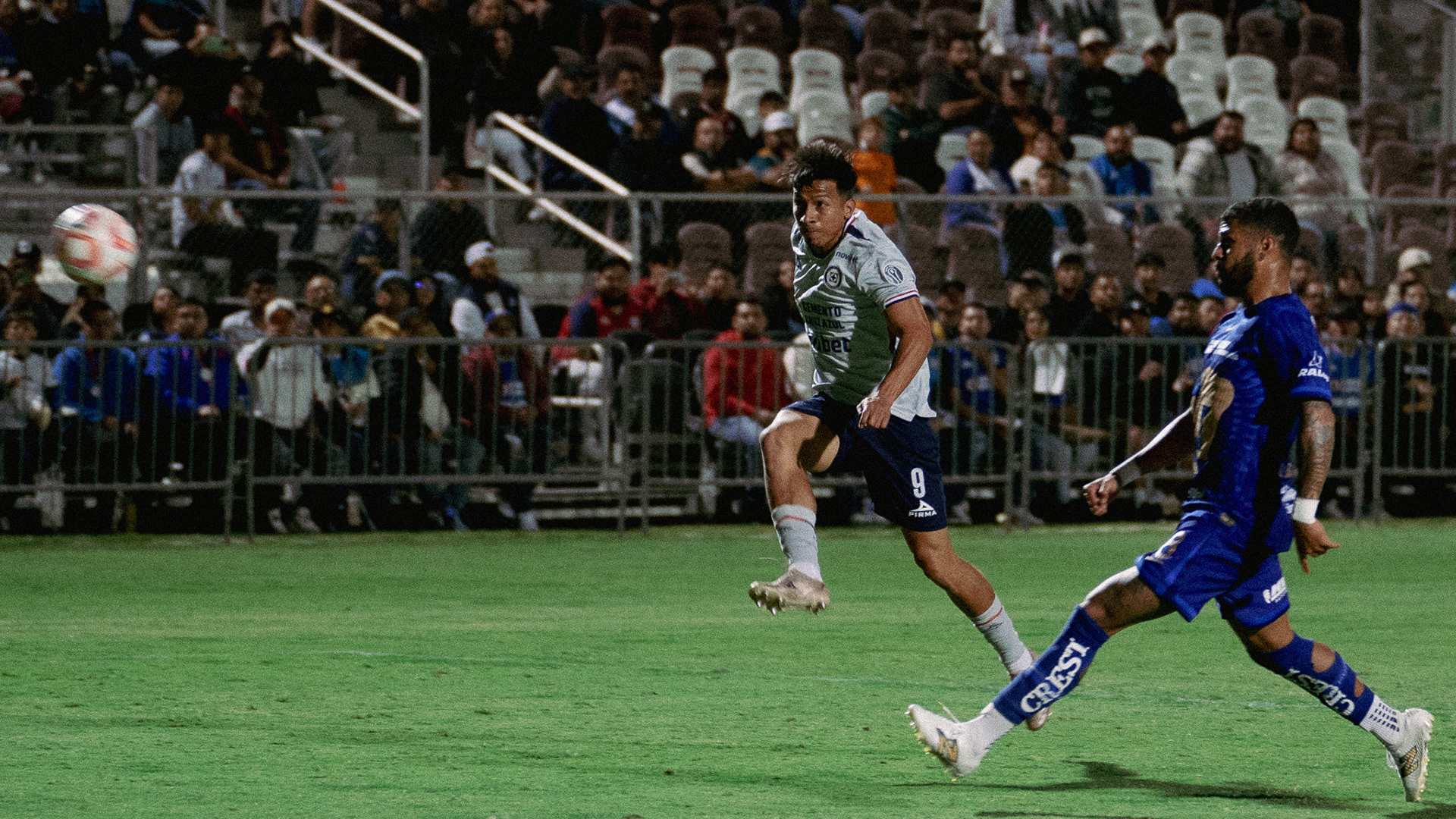
Pumas dominated the second half, but it was all prowl, no pounce. Jose Paradela put the game to bed with a 2-0 strike in the 79th minute, sending the felines packing.
Cruz Azul heads next to Fresno to face León on Sunday, October 12th, continuing their California conquest. Pumas’ losing streak now stretches to four, but they’ll have a chance for revenge on November 8th to close out the regular season against La Máquina. For now, it’s a long trip back as they prepare for their clash with Rayados.
-Jaime Landeros
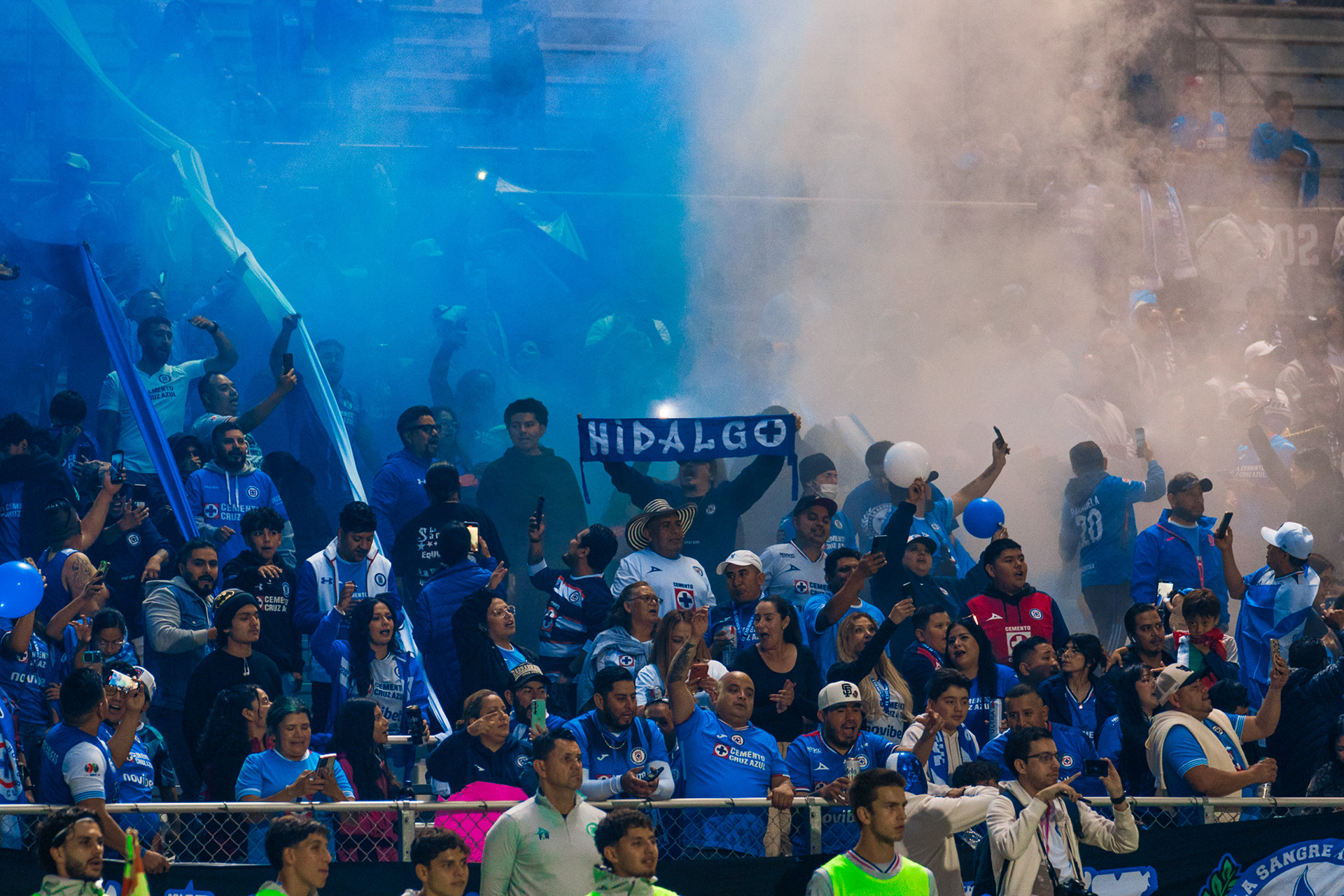
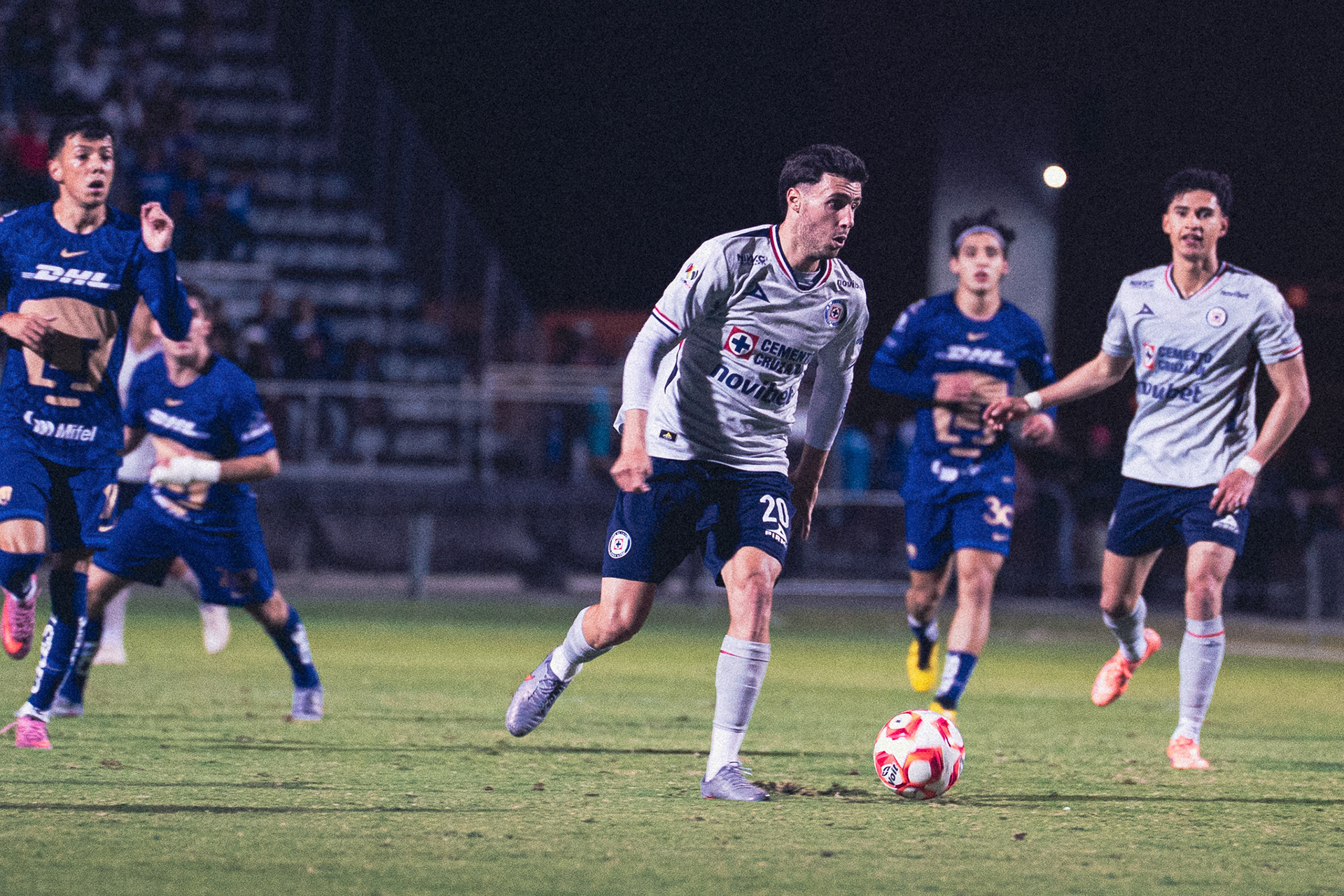
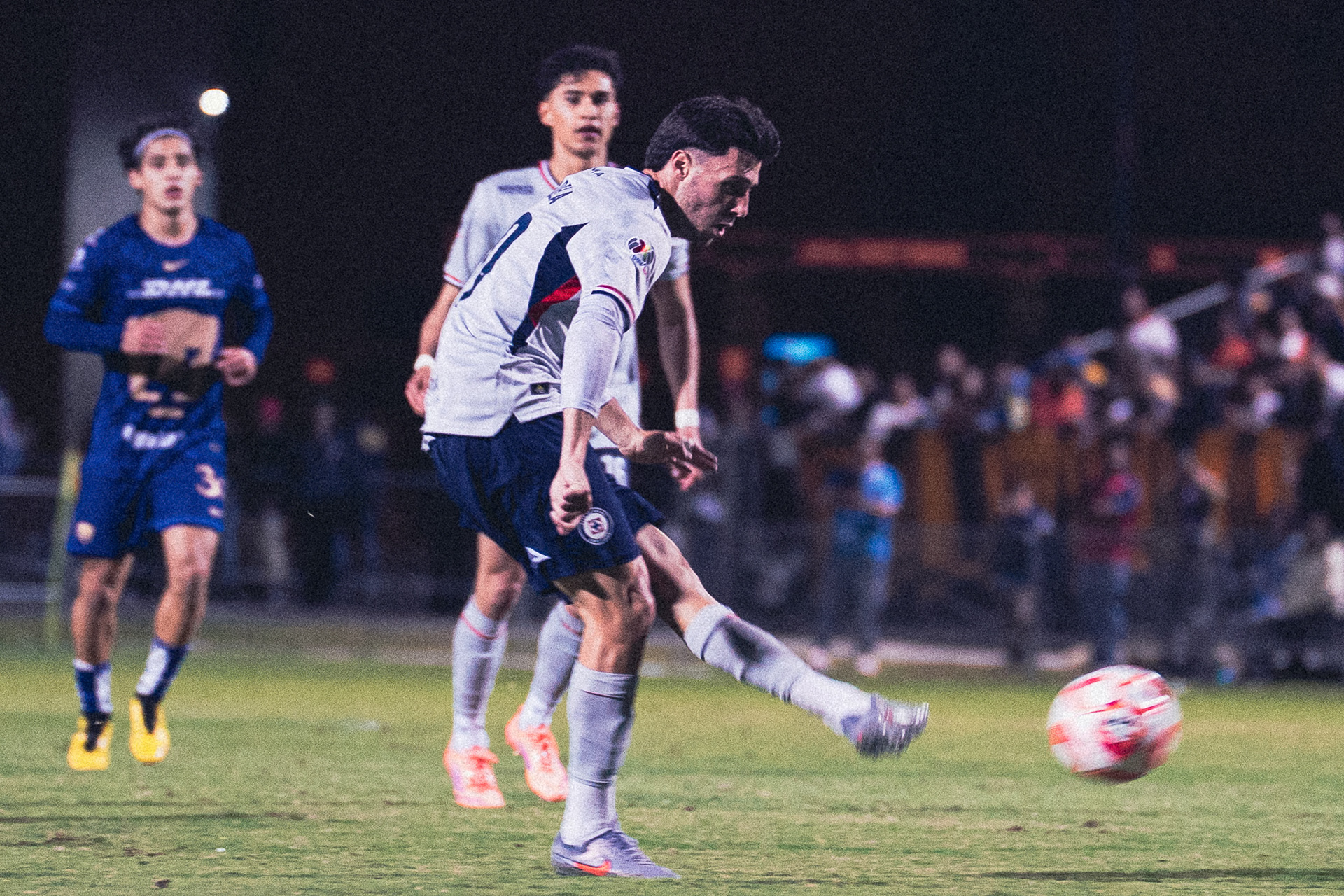

Wild Comeback in Guadalajara
The Estadio Akron was the stage for one of the wildest matches in recent Chivas history. Hosting Atlético San Luis in their home debut, El Rebaño Sagrado delivered a game filled with goals, drama, errors, and redemption. It was a match that felt more like a studio Ghibli anime wrapped up in a WWE Smackdown cage match and seasoned with playoff vibes than the run of the mill league game.
This was Chivas first home-game of the season and expectations were high. Gabriel Milito decided to repeat the same starting XI from last week’s 1-0 loss to León, demonstrating confidence in his squad which would be playing on freshly upgraded World Cup-level turf.
At the start of the match Chivas showed urgency and fluidity. The breakthrough came in the 11th minute. Brian "Cotorro" González delivered a perfect cross that new arrival Ricky Ledezma headed on target. The keeper denied the header, but the rebound was accidentally pushed into the net by a San Luis defender giving Chivas the lead.
In the 45th minute Cade Cowell scored his first goal of the season, finishing off a well-executed corner kick to make it two-nil. Milito's Chivas finished the half on a high note, that had fans at the Akron stadium rejoicing.
The start of the second half, however, would have the Chiva faithful questioning their allegiance to the club. Eduardo Aguila pulled one back with a powerful header off a corner in the 50th minute. Then, inbthe 69th minute, disaster struck for Chivas as Erick "Guti" Gutiérrez committed a clumsy foul in the box, giving San Luis a penalty which João Pedro converted to level the match.
Momentum shifted completely. And San Luis now had Chivas against the ropes. In the 75th Galdamez put San Luis in the lead, stunning the Chilla-hermanos in attendance.
Chivas was looking rattled and disorganized prompting Milito to make some strategic substitutions. Efraín Álvarez replaced Cade Cowell while Alan Mozo came in for Ledezma. Chivas improved but where still losing the match so in the 81st minute Milito made two more subs.
Hugo "Vegeta" Camberos replaced Bryan Gonzalez and Armando "Hormiga" Gonzalez came in for season striker Alan Pulido. The change in energy was immediate. Within five minutes, La Hormiga González equalized with a beautiful header to tie the game.
The stadium exploded with a renewed sense of hope and fans lit up social media with anime references: Camberos "unleashing his ki" while Hormiga "activated his chakra." But Chivas weren’t done yet. In the 90th minute Luis Romo with an immaculate cross found Efraín who served it on a silver platter for Hormiga González to push it into the back of the net to complete his double and put Chivas back in the lead.
It was an emotional rollercoaster in Guadalajara. From a commanding lead to a total collapse, and then a furious rally led by super-subs. This was a match that had everything. It had been a long time since Chivas showed that kind of attitude to fight and claw their way back.
In the past the whole team would just fall apart but today that wasn't the case.
Final Thoughts
Chivas showed flashes of brilliance, but also concerning defensive lapses. If Milito can clean up the back line, the attack looks ready to cause serious damage in the tournament. Players like Efrain Alvarez and Hormiga Gonzalez maybe have just shown Milito that they are deserving of the starter spot! As for Hormiga González, he may have just earned himself a bigger role moving forward. For now, the fans go home entertained and relieved. Knowing that with a couple of defensive tweaks they have a team ready to take over the tournament by storm.
-Eduardo Gutierrez-Perez
Liga MX Match Week Two Roundup
Midweek Action – Jornada 2 Kicks Off
Jornada 2 got underway midweek at Ciudad de los Deportes, where Club América faced off against Club Tijuana, now coached by the always-colorful Sebastián “Loco” Abreu. With the Estadio Azteca undergoing a major renovation ahead of the 2026 FIFA World Cup, Las Águilas have made a temporary nest in the former home of bitter rivals Cruz Azul.
The scent of fresh cement wasn’t enough to throw them off — América flew past Xolos with a commanding 3–1 win.
Over in La Comarca Lagunera, fans were treated to a six-goal thriller between Santos Laguna and Toluca. The defending champions pulled off a stunning comeback, thanks to two goals apiece from Helinho and Robert “La Pantera” Morales, making a strong case for another title run.
Viernes Botanero – Friday Night Goals
Friday brought us a triple treat of matches:
Necaxa dominated the newly-owned Gallos Blancos of Querétaro with a confident 3–1 win, moving up to 8th in the table.
Monterrey, sitting in 12th, got the job done on the road at San Luis with a first-half strike from Berterame in the 42nd minute.
Mazatlán, currently in 5th, wrapped up the night with a 2–1 victory over struggling Puebla at El Encantostadium.
Sábado Futbolero – Drama Across the Board
Saturday brought us another exciting tripleheader:
Tigres edged out Juárez 1–0, thanks to a decisive goal by Oziel Herrera.
The spotlight match of the night was the season debut of Chivas, who visited León riding high after a strong preseason under Gabriel Milito. But a 65th-minute penalty from James Rodríguez sealed a 1–0 win for Los Esmeraldas. A disappointing result for el Rebaño, but promising signs emerged — especially the debut of 17-year-old phenom Santiago Sandoval.
And then came the chaos: Atlas vs. Cruz Azul.
Atlas came out flying, scoring in the 17th minute after a mishap from keeper Kevin Mier. Diego Gonzálezadded a second in the 31st, and they nearly had a third before halftime.
But Cruz Azul came alive in the second half. A VAR-reviewed penalty was slotted home by Ángel Sepúlveda, who quickly followed with a golazo to level it 2–2. Yet another Mier error gave Atlas a third, but La Máquinakept pushing. In stoppage time, Sepúlveda completed his hat trick with a powerful header to tie it 3–3.
A wild match, and while new coach Larcamón has work ahead, this Cruz Azul squad is clearly building momentum.
Domingo de Misa – All Eyes on Pumas
Sunday closed out the matchweek with Pumas vs. Pachuca.
Much of the attention was on 17-year-old goalkeeper Rodrigo Parra, hoping to bounce back from a rough debut. Pumas took an early lead through new signing Ángelo “El Pantera”, who pounced on a rebound. But Parra repeated a costly mistake from the previous week — a poor touch on a back pass led to an equalizer.
At 27 minutes, Carasquilla lofted a gorgeous assist to Ruvalcaba, who made it 1–1. Pumas briefly retook the lead, but Parra misjudged a cross, allowing Cádiz to head in the equalizer. 2–2 at the break, and growing questions about Parra’s readiness for top-flight play.
Rumors are swirling about Portuguese veteran Rui Patricio possibly joining, after the Keylor Navas deal fell through. But Parra still shows promise — especially with his shot-stopping — and may just need more time.
In the second half, Pachuca upped the tempo. A cleared corner fell to Gastón Togni, who blasted in a long-range stunner in the 69th minute to make it 3–2. Pumas fought hard, but couldn’t find the equalizer.
Final Whistle – Jornada 2 in the Books
And with that, Jornada 2 comes to a close — a week packed with goals, youthful debuts, comebacks, mistakes, and magic. Buckle up, because if this is the pace of the season, Jornada 3 can’t come soon enough.
-Eduardo Gutierrez-Perez
From Sevilla with Love
Matías Almeyda was recently unveiled as the new manager of Sevilla FC, and during his introductory press conference, he once again made Chivas fans’ hearts swell with pride.
“I had offers to coach national teams in South America, but I chose a club called Chivas — a great club, one with 40 million fans,” Almeyda said. “That’s like the entire population of Argentina supporting a single team. There was definitely some pressure.”
“A club made up entirely of Mexican players, always at a disadvantage compared to other teams who can field foreigners. Yet in just two and a half years, we reached seven finals and won five championships — a reflection of everything we trained for. It was a time of great joy for me,” he added. “They treated me incredibly well. I have deep affection for that club.”
And what happened then? Well, in Guadalajara they say — the Chiva Hermano’s small heart grew three sizes that day. And then — the true meaning of Campeonísimo came through, and the Chiva Hermano found the strength of ten Chiva Hermanos… plus two!
-Joel E Acevedes
Mexico vs Honduras
Gold Cup Semis | Levi's Stadium
2 July 2025



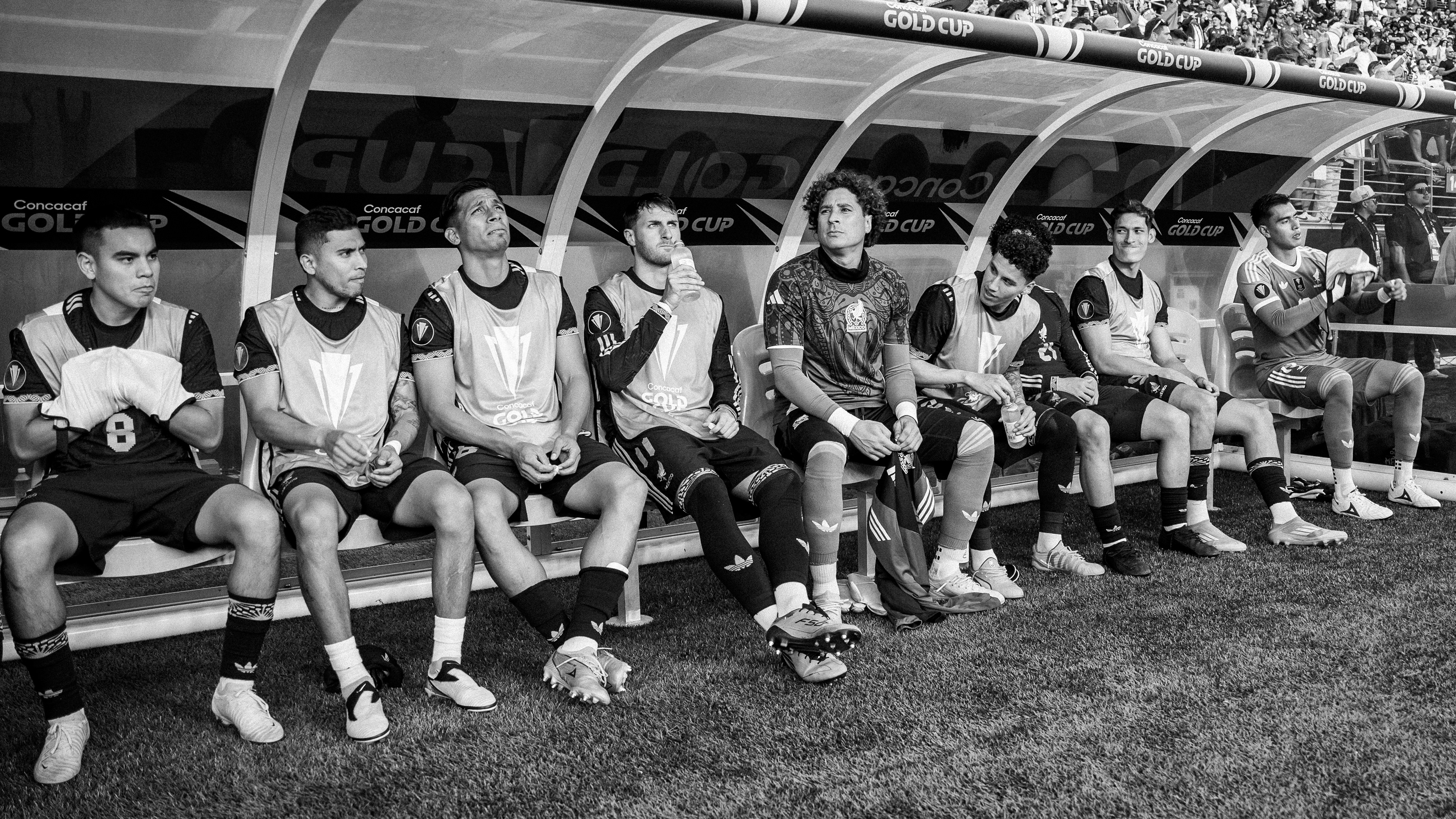

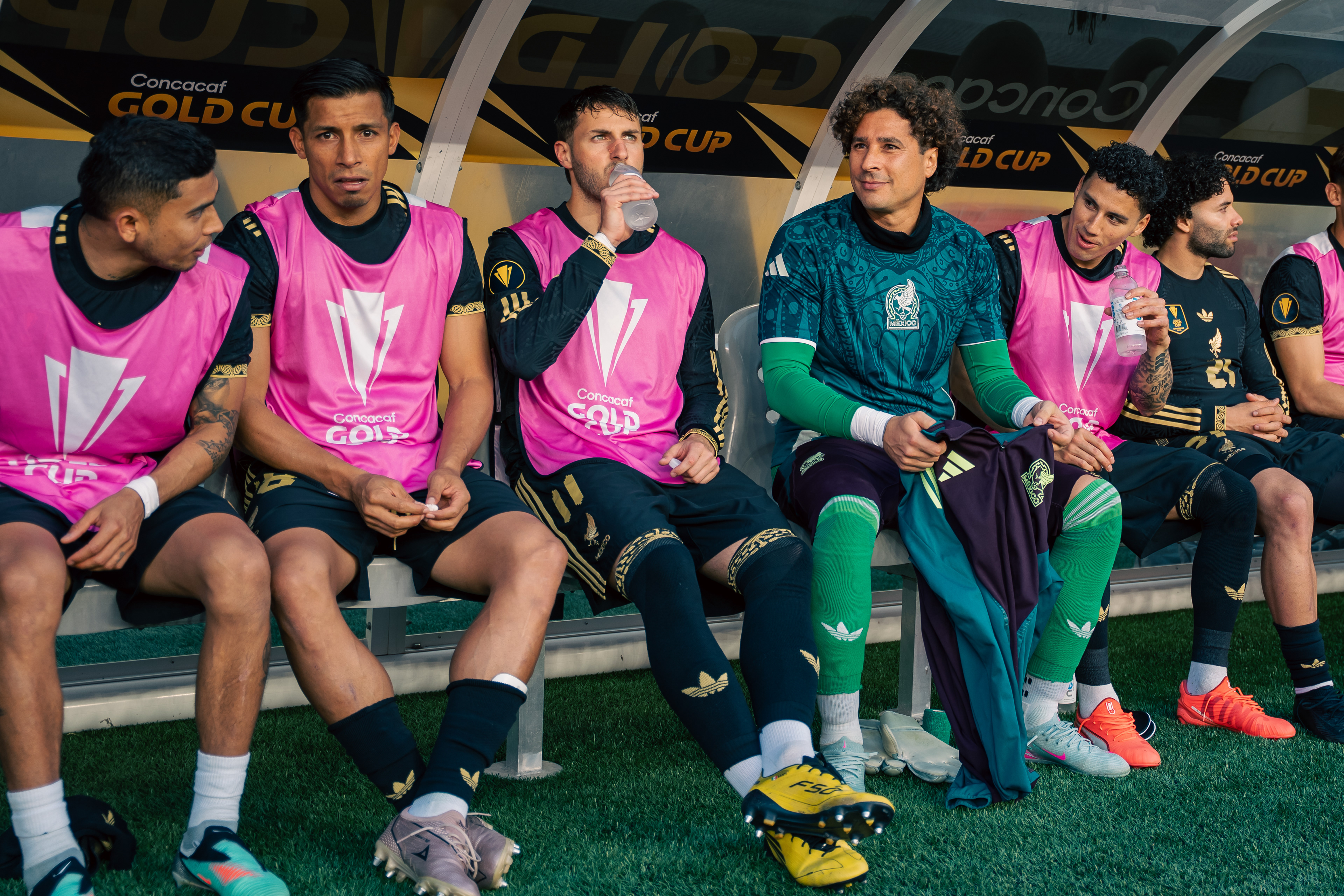
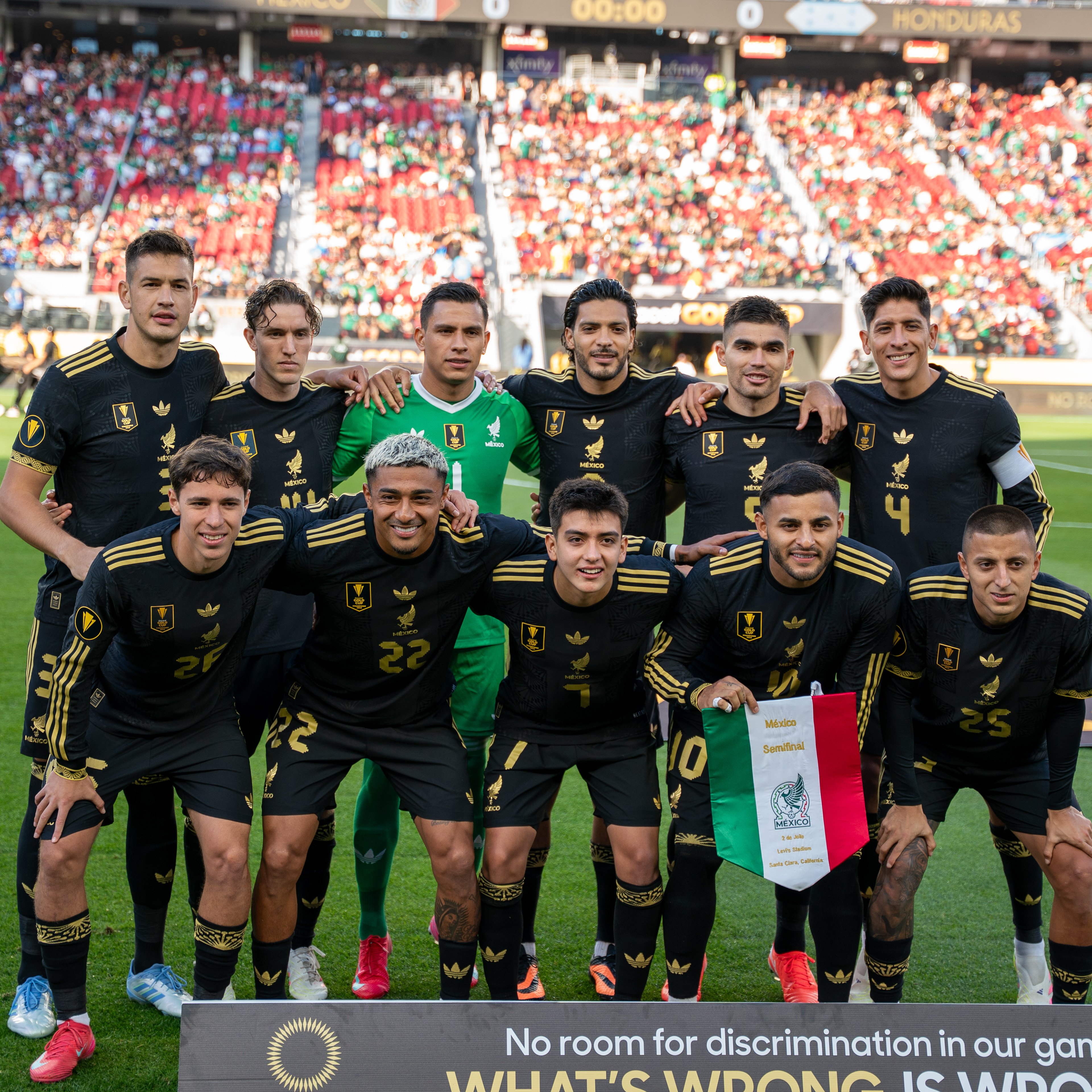
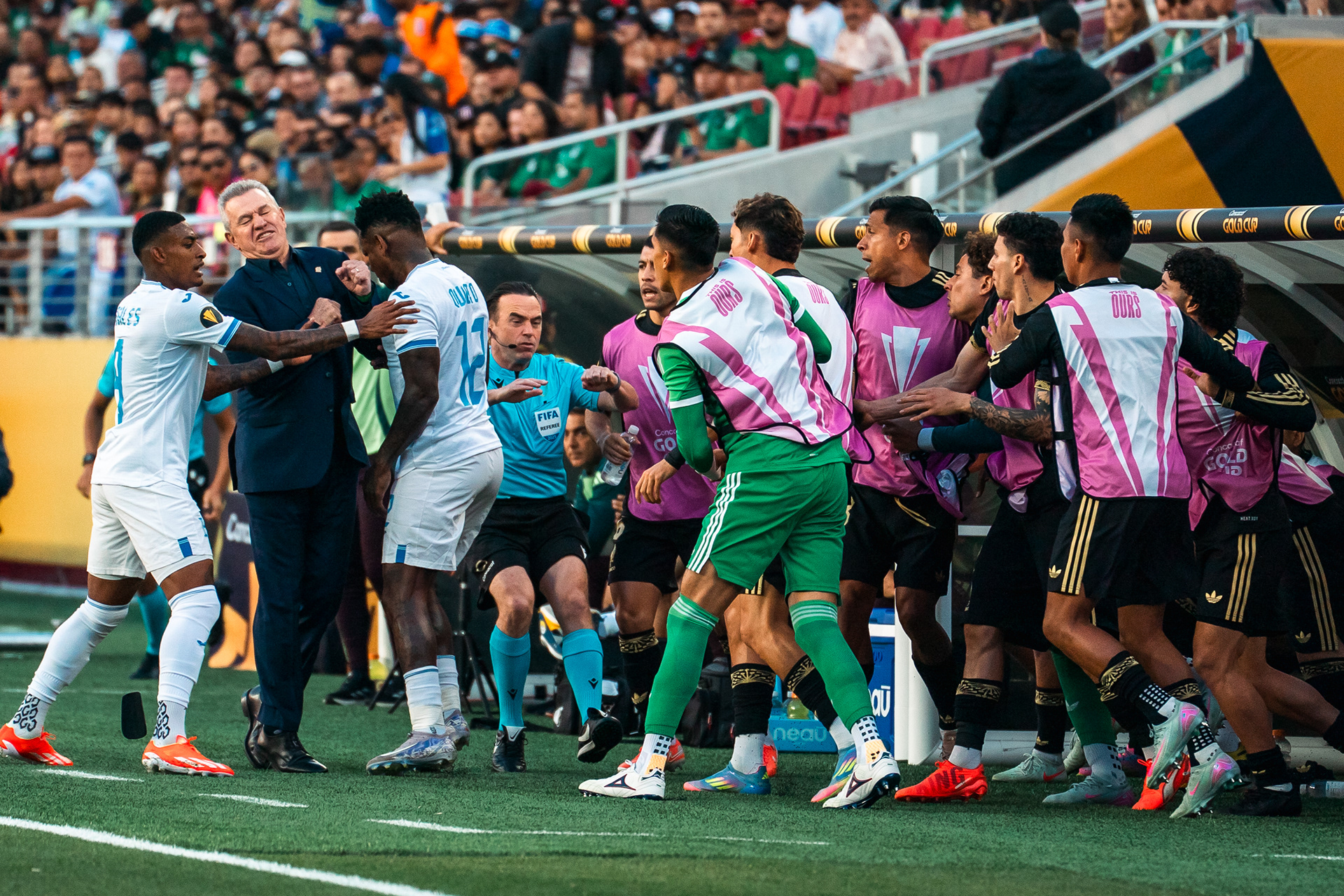



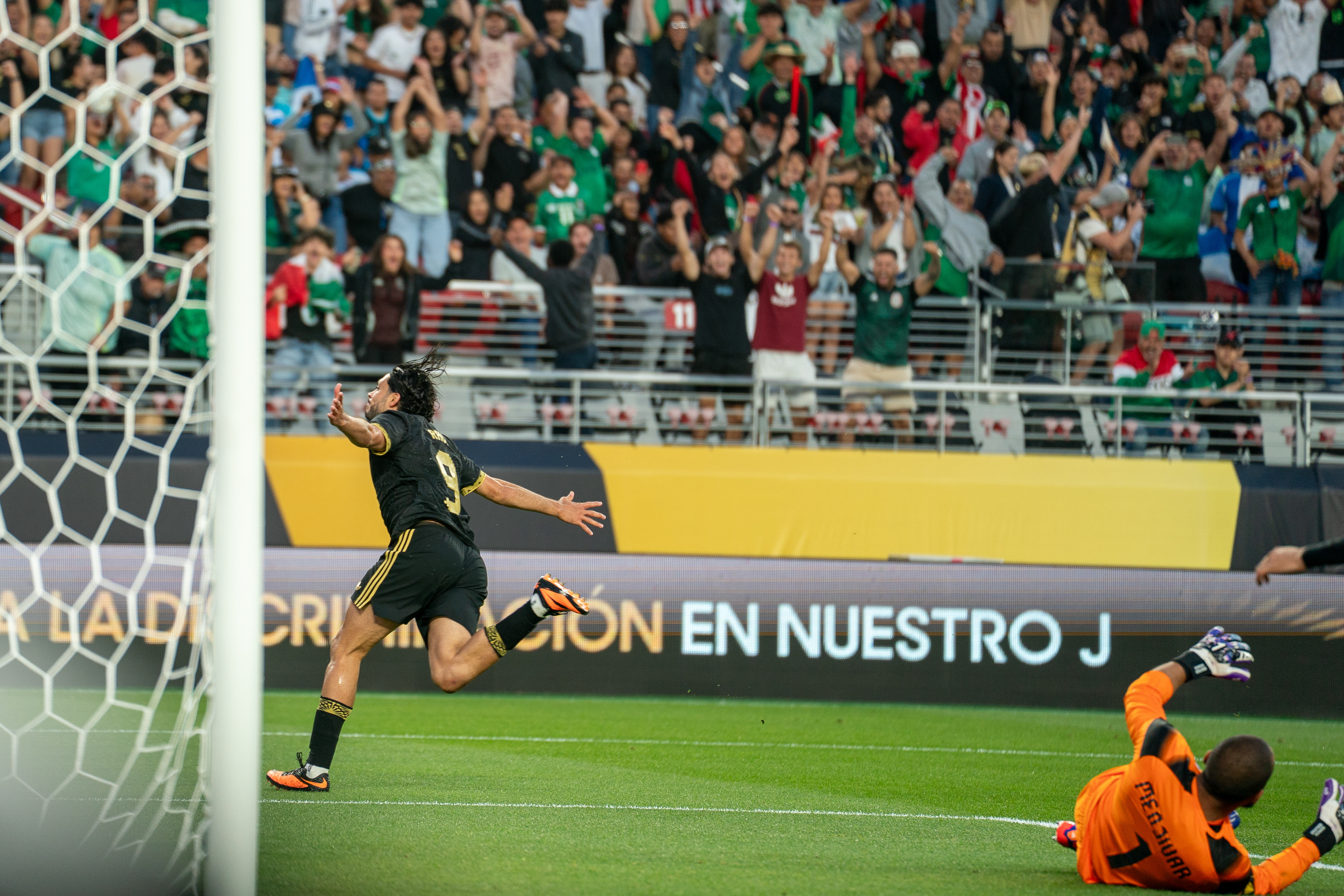
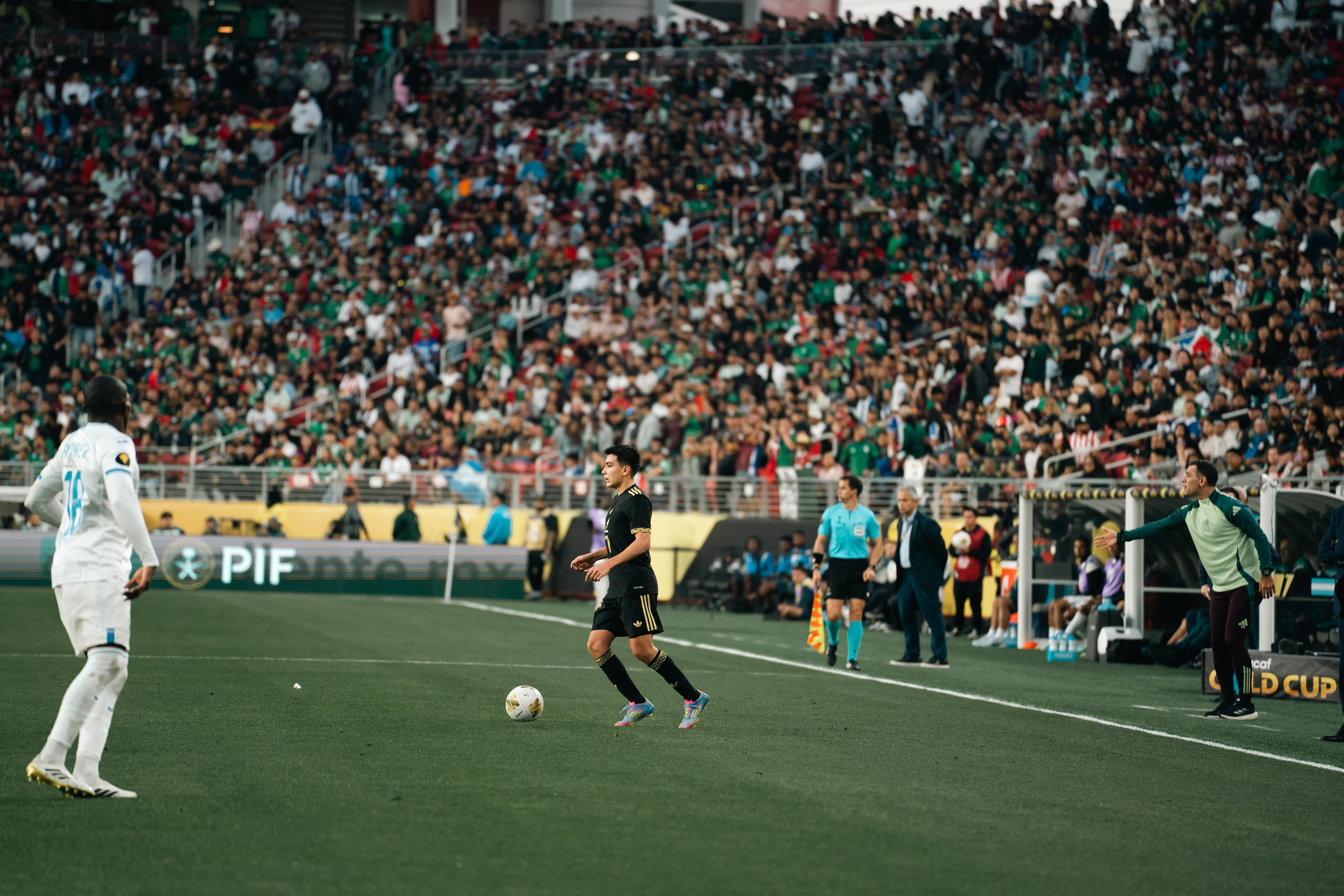
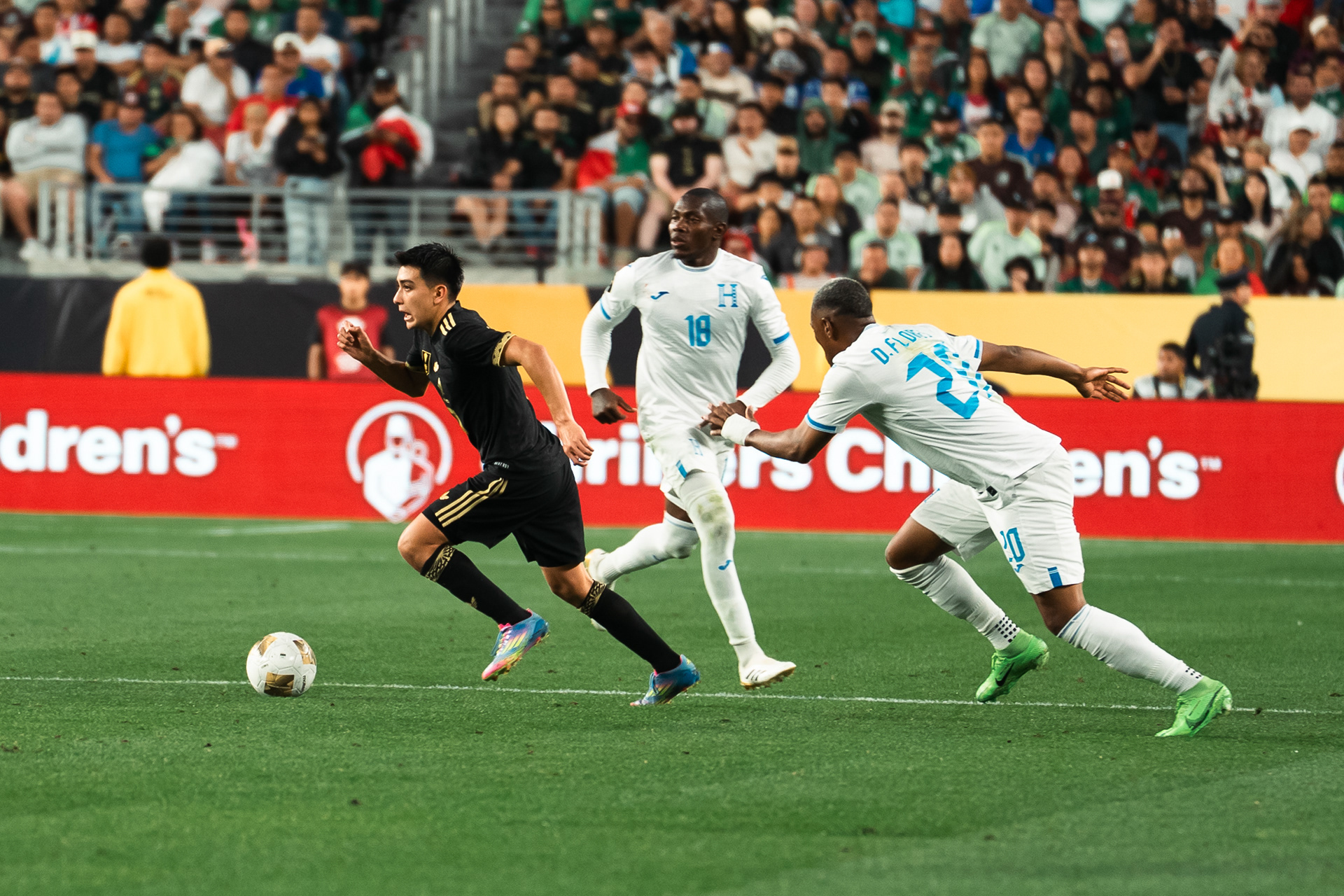
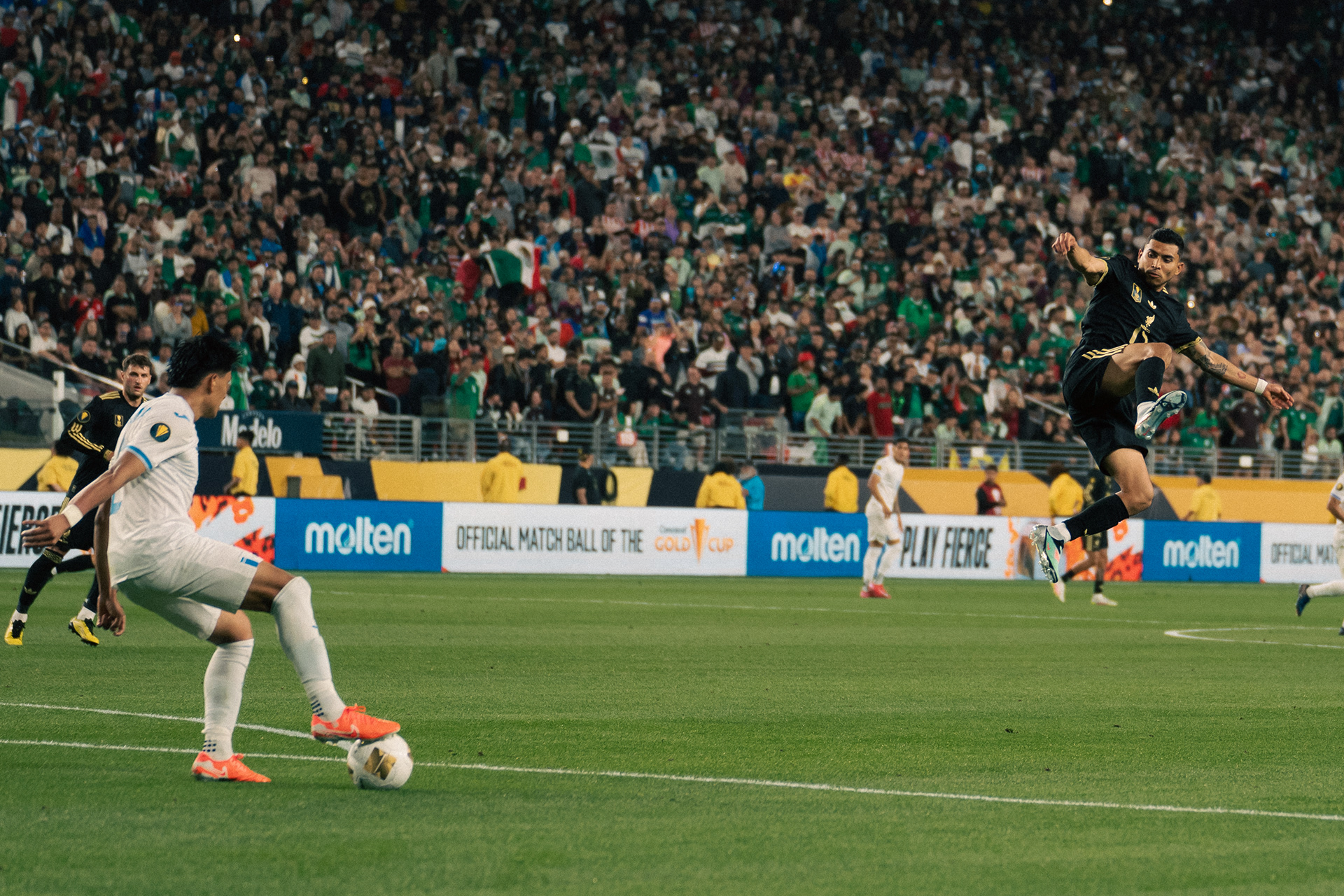

The Grass is Always Greener
During the 2022 FIFA World Cup qualifiers the Mexican media decided to change up the metrics for success and declared that regional rivals Canada and the United States had surpassed the Mexican national team.
Never mind that Mexico is the most dominant team in CONCACAF. That they have a FIFA Confederations Cup, Two U-17 World Cup's and an Olympic Gold medal in their coffers. That had been pushed aside. What mattered now was which national team had the most players in the top European leagues.
And what better proof than the head to head matches during the CONCACAF third round World Cup qualifying phase. The new and improved Octogonal qualifying had both Canada (1-1) and the U.S (0-0) taking a point from the dreaded Azteca stadium. And then beating Mexico 2-1 and 2-0 in their respective homes!
It didnt matter that in the final standings of the Octogonal Mexico finished in 2nd place, tied in points with Canada, and ahead of the United States. The die had been cast. A first round exit at the Qatar World Cup further cemented the predicament that the regional rivals had surpassed Mexico which were in their end times. A complete overhaul of the nation's football system was in order. Burn it all down they said.
And what did the regional rivals renassaince yield at the World Cup: a combined total of one win with the U.S. defeating mighty Iran one-nil. And Canada losing every game to finish their group stage participation with 0 points and a -5 goal differential. In the ensuing knockout stage (round of 16) the U.S. was taken apart 3-1 by the Netherlands.
These results again didnt matter. What mattered was that Mexico had not had a player in a top European club since Rafael Marquez days with Barcelona. Mexican players were struggling to compete in Liga MX while Canada and the U.S. top players were competing in the Champions League!
The next "I told you so" came in the form of the 2024 Copa America hosted by the United States. Mexico, which were on their second coach, once again failed to get out of the group stage. And were now looking for a third coach to take over the reigns.
Hosts the United States also failed to get out of the group stage and only scored 3 points to Mexico's four. Canada also with four points product of 1-0 win over Peru and a scoreless draw over Chile advanced to the knockout stage where they defeated Venezuela via penalty kicks. They were then defeated by eventual champions Argentina in the semifinals finishing the tourney in a respectable 4th place.
While Mexico was being judged harshly the Mexican pundits praised a Canada that only won one game in regulation time. It is like they forgotten that Mexico has been in two Copa America finals and bested pretty much every CONMEBOL rival in the group stage and beyond. That was in the past they said, plus it was done with majority Liga MX players which didn't fit the Europe or bust narrative.
This brings us to the 2025 Gold Cup. Canada was knocked out of the tournament by minnows Guatemala. While perennial hosts the United States had to claw their way to the semifinals with a penalty kicks victory over Costa Rica.
Regardless of how the Gold Cup ends one thing has been made clear which is that the golden generations of Canada and U.S. have yet to surpass the Mexican national team's achievements. All three national team's will be hosting the 2026 World Cup which should put a nail in the coffin of who's who of CONCACAF. However, knowing the soap opera influenced Mexican media I'm sure they will come up with a new metric of success.
Joel E Aceves
Gold Cup: Failure is Not an Option for Mexico
We’re exactly one year away from Mexico’s opening match at the 2026 World Cup—and this team still doesn’t inspire much confidence.
Winning the CONCACAF Nations League was a step forward, but let’s be honest: these “Mickey Mouse” tournaments aren’t preparing us for what’s coming. Canada was hyped after finishing first in World Cup Qualifying, only to crash out of the 2022 World Cup without a single win. This region simply isn’t pushing Mexico to the level required for true international success. Winning the Nations League and Gold Cup should be the bare minimum.
The recent friendlies against Switzerland and Turkey were far more valuable. That’s the kind of opposition Mexico needs—teams that test our tactics, resilience, and quality. We need to be scheduling matches against top-10 nations and facing diverse playing styles from Africa, Asia, and Europe. Competing once again in the Gold Cup this summer feels like a missed opportunity.
So what should expectations be for Mexico at the World Cup next year? Historically as hosts, the quarterfinals have been our ceiling. Based on current form and the available player pool? Round of 16 looks more realistic—and that’s not good enough.
Yes, you can only beat who’s in front of you. But another lackluster Gold Cup showing could cost Javier Aguirre his job. Failure is simply not an option. Mexico must win—and win convincingly—this summer.
-Jaime Landeros 11 June 2025
Much Ado about Cheech
Javier "Chicharito" Hernandez return to Club Deportivo Guadalajara for the Clausura 2024 season brought much needed excitement to the Chiva faithful. Chivas had recently lost a league final against Tigres, despite having a two-goal lead. And were desperate to make another run for a championship that seems to orbit the club's atmosphere every 10 years. Perhaps, Chicharito was the missing piece of the puzzle needed to win the league title.
Such was the excitement and expectations for Hernandez that his presentation was made at a sold out Akron stadium. A feat never seen before in Liga MX.
The club spared no expense in announcing Chicharitos return: fireworks, cheerleaders, clowns, midgets and ballooons decorated the stadium. There were even video recordings on the stadium's big screen of Hernandez former coaches Sir Alex Ferguson and Carlo Ancelotti wishing him the best.
And just like the firework display fizzled out so did the excitement for Chicharito. Having scored only one goal in the season the expectation was perhaps Chicha will light up for the playoffs. However, Hernandez firepower went missing like a rent-a-center payment and Chivas were eventually eliminated by archival club America in the semi-finals.
"I am honored of the wonderful family that is Chivas. I have no doubt that we will recover from this and return much better for the next tourney," Hernandez said after the match.
Unfortunately for Chivas they did not recover nor did they return much better for the Apertura 2025 season. The club failed to qualify for the league playoffs with Chicha maintaining his one-goal per tourney quota.
It is believed that Hernandez only has six months left in his contract basically until the end of the upcoming Liga MX Apertura 2025 season. Chivas has already brought Argentine Gabriel Milito to manage the club and expectations are once again renewed that the club can push for some silverware.
Hernandez can either play a swan song or continue on his pseudo-motivational speaker routine that have fans cringing. Sadly, I don't expect much from Cheech at this point. And see him as a hindrance, specially given his high salary and the clubs monetary woes. "Imaginemos cosas Chingonas," Hernandez once said. And that's where he seems to have remained in imagination land.
-Joel Aceves
Ciao Chivas
To no one’s surprise, Chivas have failed to qualify for the 2025 Clausura Play-In Tournament. And yet, I can’t help but feel disappointed. Everything was lining up for Chivas to sneak into that 10th seed spot. Tigres took care of business against Pumas — all Chivas had to do was win. A tall ask, sure, considering they only managed one away win all season (ironically, against Pumas). But Estadio Jalisco is familiar territory — it used to be their home.
Hugo Camberos returned to the starting lineup and looked ready to carry the team on his back. Just 30 minutes in, he broke the deadlock and gave Chivas the lead. But as has become painfully familiar, the joy didn’t last long. Serbian striker Uroš Đurđević struck back for Atlas, notching his 12th goal of the season — tying him with João Paulo and José Zúñiga atop the scoring charts. Once again, Chivas proved most vulnerable right after scoring. It’s a bad habit that’s haunted them all year.
The second half? Brutal. The lack of urgency and intensity from the players made it feel like Gerardo Espinoza had told them at halftime to start their vacation early. Did no one remind them they had to win? That Tigres was beating Pumas? That despite being equal on points and goal difference, Pumas would leapfrog Chivas thanks to more goals scored?
Atlas looked more likely to steal the win. Đurđević, chasing Atlas’ first-ever golden boot, nearly got it in stoppage time — only to be denied by Tala Rangel in the dying seconds.
In the end, Atlas crushed Chivas’ slim playoff hopes. For Atlas fans, that heartbreak might be even sweeter than a win.
Now, Chivas face a long offseason with more questions than answers. Some clarity is already here — the front office announced Espinoza’s departure, and shut down rumors linking Mateo Chávez to AZ Alkmaar. Hugo Camberos is still negotiating a contract extension. Will Chivas try to offload Chicharito this summer? Are they entering a rebuild? Will Amaury Vergara finally show his face? And most importantly — who’s next in the dugout?
The season ends in familiar fashion: early exits, fan frustration, and another reset. For a club with Chivas’ history, that shouldn’t be the norm. But right now, it feels like it is.
-Jaime Landeros
Puto Chant: American Homophobia or Mexican Shithousery?
By Athai Juarez
In a league plagued by financial inequality, safety concerns, and declining viewership, both U.S. Soccer and MLS have chosen to focus their attention elsewhere—on the pitch—by villainizing the very fanbase that fills their stadiums week in and week out: the Mexican fan.
The narrative of “Bad Hombres” didn’t suddenly emerge in 2015—it’s a sentiment that’s long existed, even before the rise of the now-infamous “Puto chant.” This controversial chant originated in Guadalajara in 2004 and gradually gained popularity across Mexico before inevitably crossing the border into U.S. stadiums. But to fully understand its reception here, it’s essential to consider the political climate of the time.
In 2004, President George W. Bush was seeking reelection amidst declining approval ratings due to the Iraq invasion and the War on Terror. His strategist, Karl Rove, shifted the national discourse to populist issues like abortion and same-sex marriage, weaponizing cultural wedge topics. Over the next few years, the U.S. saw a spike in hate crimes against LGBTQIA+ individuals and medical professionals at abortion clinics. This era also marked a cultural and ideological tug-of-war that culminated in a political shift toward more inclusionary values.
Meanwhile, Mexico’s national soccer team was thriving, rising in dominance over the U.S. team. Around the same time, the “Puto chant” became more prominent, often shouted alongside the iconic U.S. “Dos a Cero” chants. By the 2014 FIFA World Cup, the chant reached a global stage, prompting an investigation by FIFA’s disciplinary committee after it was heard during matches against Cameroon and Brazil. The investigation was ultimately dismissed, with FIFA stating the chant was not insulting in the specific context.
Ask most Mexican fans, and they’ll tell you the chant is a form of psychological gamesmanship—a way to rattle the opposing goalkeeper—not an expression of homophobia. In fact, many argue that outsiders simply don’t grasp the nuances of Mexican idiosyncrasy, where football is a way of life and deeply embedded in cultural expression. This perspective is reinforced by Mexico’s own historical acknowledgment of gender fluidity and third-gender roles, which date back to pre-Columbian times. One of today’s most beloved Mexican public figures is Wendy Guevara, a trans woman, further reflecting the nation’s growing visibility and acceptance.
Still, under international pressure—primarily from the U.S. Soccer Federation—the Mexican fanbase has increasingly come under fire. Matches are being paused or threatened with cancellation. Fines are levied. The label of “homophobic” has been stamped across the entire supporter culture.
And yet, the irony couldn’t be more glaring: this outrage peaks at a time when American policies are scaling back protections for the very communities they claim to defend. Across the U.S., gay and trans rights are under renewed attack from both state and federal legislatures.
So, the lingering question remains:
Was this ever really a Mexican problem—or just a mirror being held up to a more uncomfortable American truth?
Pauno TV
Defender Jesús Orozco Chiquete, in a recent appearance on the Reportero Podcast, mentioned that under coach Veljko Paunović, Chivas introduced him to coaching methods he had never experienced with a Mexican manager. Chiquete noted that he had never had a coach place such strong emphasis on throw-ins, quoting Paunović as saying, “You can create an attacking chance from throw-ins.”
The most attention-grabbing part of the interview, however, was Chiquete’s admission that he had never previously watched opponent film. He explained that Paunović regularly had the team study footage of their upcoming opponents, making small tactical adjustments depending on who they were facing.
This has sparked a broader conversation, with many now asking: Are Mexican coaches falling behind in modern coaching methods?
-Eduardo Gutierrez